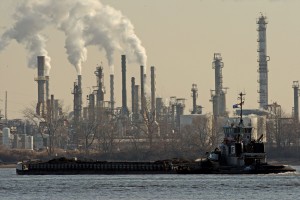Corbett Administration Ignoring Pennsylvania’s Climate Change Law
-
Marie Cusick

Michael Bryant/Inquirer/Landov
The Corbett Administration has failed to produce a pair of legally required reports about climate change, and the governor is reluctant to publicly discuss the topic.
Despite widespread scientific agreement about the risks of climate change, the issue has become highly politicized.
After President Obama recently announced his plans to tackle global warming, Governor Corbett called the proposal a war on coal and jobs.
While the Corbett administration is critical of federal action on the issue, it’s also been ignoring a Pennsylvania law requiring the state to address climate change.
“Science, not emotion”
A few months after taking office in 2011, Governor Corbett gave a speech saying science would guide his administration’s policy decisions.
“We need to protect the environment,” he said. “But we must do it on science, not emotion.”
However, not everyone agrees the governor is doing all he can to combat climate change.
According to a 2009 state report, Pennsylvania contributes a full one percent of the greenhouse gas emissions for the entire planet.
Nationally, the state ranks third for carbon dioxide emissions and fourth for coal production.
Christina Simeone chairs the state Department of Environmental Protection’s Climate Change Advisory Committee and works for the environmental organization PennFuture.
“There’s real questions about whether the Corbett administration believes that human-induced climate change exists,” she said.
The advisory committee was set up under a 2008 law known as the Pennsylvania Climate Change Act signed by former Governor Ed Rendell, a Democrat.
The law directed the DEP to produce a pair of non-binding reports: one is an overall climate change impact assessment, the other is an action plan for lowering greenhouse gas emissions.
Those documents were first published four years ago. The law requires them to be updated every three years, with the committee’s input.
Both updates were due last year. But Simeone and others who worked on drafts say they don’t know why neither report has been published yet.
“A lack of support”
Joe Sherrick was the DEP’s Climate Change Program Manager. He was charged with overseeing the process, but tells StateImpact Pennsylvania he left the job a few months ago out of frustration.
“There was a general lack of support from the administration and from the department for anything related to climate change work,” Sherrick said.
Doubts about the administration’s commitment to the issue surfaced earlier this year when the DEP Secretary at the time, Michael Krancer, questioned the scientific consensus on climate change.
“There is no uniformity within the scientific community on how much the warming is occurring, over how much time,” Krancer told StateImpact Pennsylvania, “And there’s no agreement about how much is attributable to the human part of it and how much is attributable to other factors.”
Actually, there is widespread agreement among the world’s scientists that climate change is occurring and the warming is due to increases in man-made greenhouse emissions.
When StateImpact Pennsylvania asked Corbett earlier this week if he believes in the scientific consensus around man-made climate change, he dodged the question.
“Well, what I believe is that we need to be able to provide jobs for the people of Pennsylvania,” he said, “Whether you view that as climate change, I don’t know. But I believe in trying to grow the jobs we need to come in with all forms of energy.”
Greg Vitali (D- Delaware) is a vocal supporter of environmental causes. He also serves on the DEP’s Climate Change Advisory Committee and is frustrated with the process.
“[Corbett has] just relentlessly refused to acknowledge the problem,” he said.
Vitali believes the lack of interest extends beyond the governor’s office.Under the law, legislative leaders are supposed to appoint people to serve on the 18-member committee.
Four of those slots have been left vacant for over a year by leaders from both parties: Republican leaders Rep. Mike Turzai and Sen. Dominic Pileggi have three vacancies to appoint between them. Democratic Senate Minority Leader Jay Costa has one.
Vitali also points out that even when the climate reports are published, they’re nonbinding and don’t force the DEP to take any action.
“If you’re giving advice to an agency that doesn’t want to take it, you have to wonder how useful that is,” he said.
“A summer climate like Georgia”
The 2009 action plan report sets a target to reduce the state’s greenhouse gas emissions 30 percent by 2020.
Raymond Najjar is a professor of Oceanography at Penn State University. He worked on the original 2009 climate change impact assessment and the update, which has yet to be released.
“The character of Pennsylvania is going to change,” he said. “If we go along a business-as-usual trajectory, we’ll have a summer climate like Georgia by the end of the century. We’re talking no snow on the ground.”
Simeone believes it’s important for Pennsylvanians to understand what these scenarios will look like.
“It has been very frustrating to continue to really work on this issue and not see it be prioritized,” she said.
A spokesman for the DEP and the governor’s office says both reports are being finalized and emphasizes they have not been deliberately held up. Although he couldn’t explain the delay or give a timetable for their release.
















